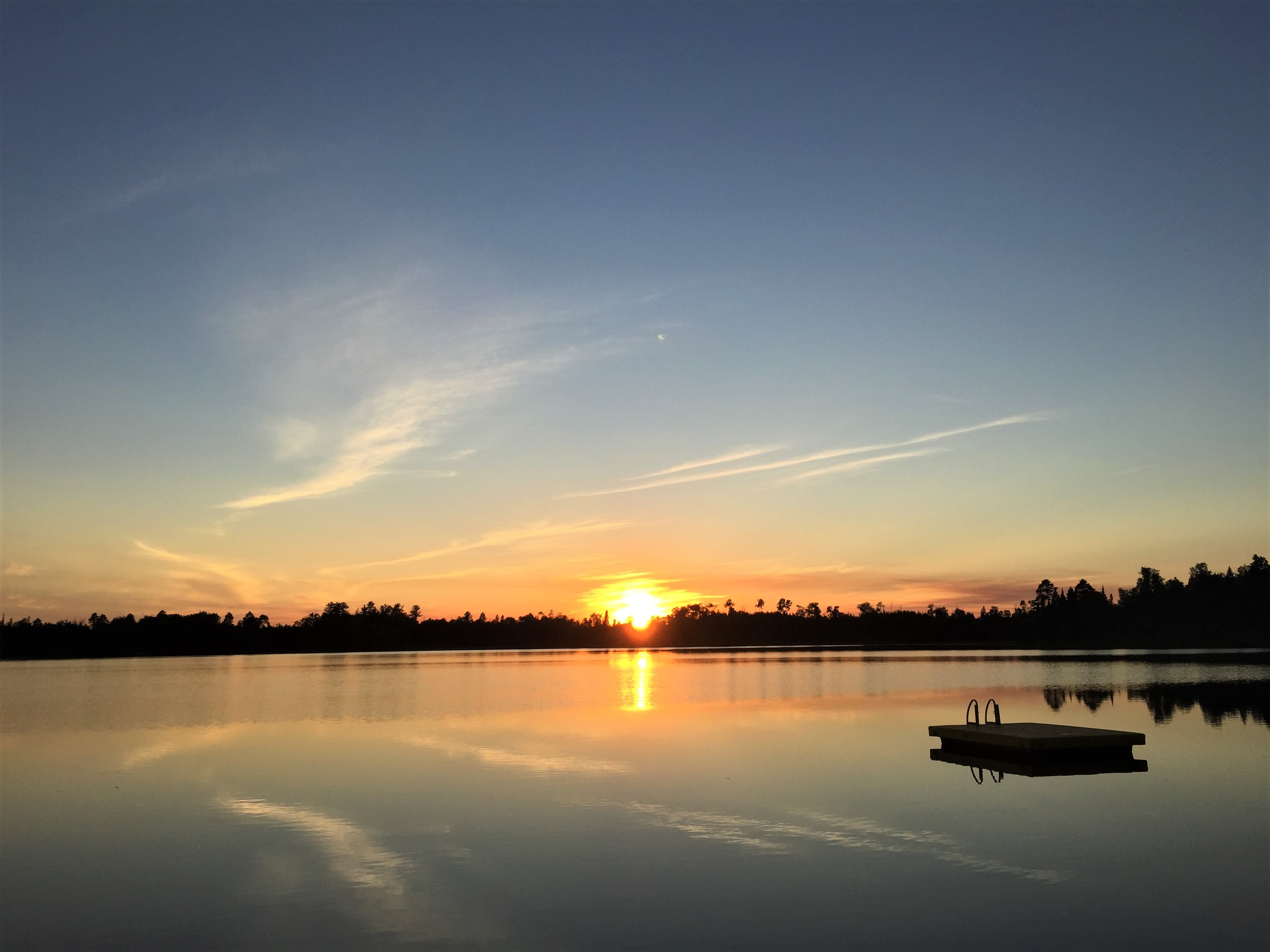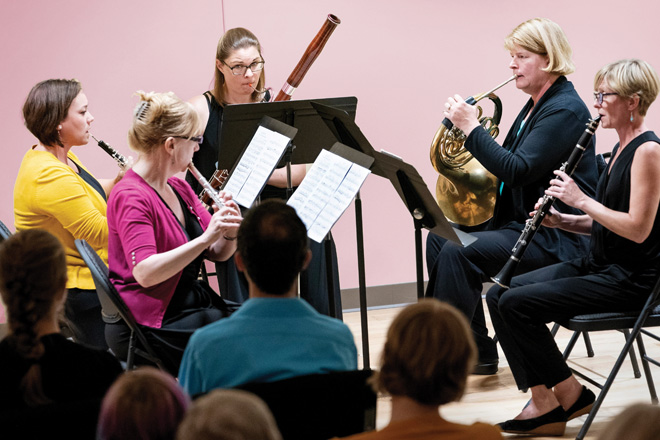Article by Chelsea Kimpton, St. Paul Academy and Summit School
Feature image: The Solerna Winds, a woodwind quintet formed in 2018, performing a recital. Kimpton is at the far right. All photos courtesy of Chelsea Kimpton.
I picked up the clarinet in fifth grade, at a musical instrument “petting zoo” of sorts, where school instruments were on display. The teacher wanted me to play the trumpet, but I was immediately drawn to the clarinet. It was love at first sight.
In junior high and high school, clarinet became my thing. From the very beginning, I was drawn to the expressivity of the clarinet and its rich, warm and often brilliant sound. The quest to produce that sound on my own instrument had me hooked. And on top of that, coming together and making music with other people became a pathway to a much larger world than I had experienced before. To me, music was — and is — one of the most beautiful methods of expressions we humans can make.
My high school years were filled with private music study and many, many hours of playing music in various chamber ensembles, large and small. Somewhere along the way I did take a dreaded required business course and chose accounting, which I enjoyed. Little did I know then that accounting would be a significant part of my graduate studies and, ultimately, my career. My heart was set on pursuing a degree in clarinet performance, so off to St. Olaf College I went.
One of the pillars of that community was the acknowledgement that we are only as strong as the weakest link and that we have a collective responsibility to take care of those around us.This guiding principle has stuck with me, and I do my best to practice it on a daily basis, both at and outside of work.
At St. Olaf, I was lucky to receive a rich liberal arts education while studying music in a conservatory-like atmosphere. My musical experiences were incredible; we traveled and performed all over the U.S. as well as Norway and central Europe. We were expected to perform at high levels and also worked diligently to create an exceptional community of caring people. One of the pillars of that community was the acknowledgement that we are only as strong as the weakest link and that we have a collective responsibility to take care of those around us. This guiding principle has stuck with me, and I do my best to practice it on a daily basis, both at and outside of work.
I continued chasing my dreams of being a professional musician through one year of graduate school at University of Iowa. Midway through the program I realized that I no longer wanted a career in music. Instead, I envisioned a meaningful and fulfilling performing life combined with a career about which I felt passionate and driven, but without the constant pressure of performance. Cue that accounting class from high school! Ten years after making that decision in Iowa, I earned an MBA in accounting and nonprofit management and I now have the balance of music and professional career for which I had long hoped.
Today, as a business officer, I still take music very seriously and am constantly broadening my musical horizons. This year marks my eighth season as the principal clarinet in the Mankato Symphony Orchestra. Our season runs from September through late May and usually consists of five concerts. Last year, we performed Gershwin’s Rhapsody in Blue, which opens with a very fabulous and recognizable clarinet solo. That performance made it on my lifetime triumphs list.
My favorite venues right now are these more intimate settings. The acoustics are fantastic, and the less formal atmosphere feels more reciprocal than a large concert hall.
I am incredibly excited about my newest musical collaboration, a woodwind quintet called Solerna Winds. Formed in fall 2018, our aim is to perform two or three recitals per year, and our next one is slated for March. Many composers have written music for our combination of instruments, and we love to share it with our audiences. Our chamber recitals tend to be less formal than larger symphonic performances, and because we are a smaller group, they can be held anywhere — in a small concert hall, black box theater, art gallery, church, even people’s homes. My favorite venues right now are these more intimate settings. The acoustics are fantastic, and the less formal atmosphere feels more reciprocal than a large concert hall.
Performances require many hours of practice, and the goal is perfection. For the first week in August each year, I do exactly the opposite with a group of people who have become my closest friends. We call ourselves the Borderline Philharmonic, and we do something together that we rarely do elsewhere: sight-read. This means we select a piece of music and just play through it. We might stop if we get lost, but the goal isn’t to hit every note; rather, it’s to make the best music we can in that moment.

Our week together has become my most cherished of the year. About 55 of us descend on a remote resort nestled between two lakes in northern Minnesota. We read chamber music during the day in the cabins, orchestral music in the evening in the lodge and have free time in the afternoons, which invariably involves time on the water and at the beach. It’s absolutely blissful walking through the woods surrounded by beautiful music emanating from the cabins.
What’s next? I want to push my comfort zones, and that likely means performing a few pieces completely new to me: a violin, clarinet and piano trio; a jazzy double bass and clarinet duet and maybe even sketching out a solo clarinet improvisational piece. I’ve found over the years that my musical ideas mirror what’s happening in other areas of my life. Last July, I moved into the business officer role at my school, and pushing comfort zones has certainly been part of that experience.
One Sunday, shortly after I stepped into my new role, a pianist friend asked me via email how it was going. I was prepping for the audit and typed a quick, off-the-cuff response, which turned out to be very illuminating. I said, “Fabulous and terrifying all at the same time! There’s this myth that we have to know everything. But really, knowing the right questions to ask, with finely tuned strategic thinking and the ability to think critically in crucial moments is what’s important. And I realize I’ve been practicing for this for years in music. There are moving and surprise variables coming at you, where you have to make split-second decisions without stopping. That’s what we do in music all the time.”
In music, we are continually responding to and interacting with each other. Who has the melody? What’s my role right now? Am I the solo line or supporting it? We pay attention to dynamics, intonation and other stylistic choices and, occasionally, we make mistakes. We, then, help each other get back on track without missing a beat. I really like that we, in the business office and in the larger school community, can collaborate and compromise in similar ways by taking in information and working with those around us. It’s been so much fun to apply these things I’ve been learning my entire life as a musician to my professional life as a business officer. I have another passion and place where I can strive for excellence on a daily basis.
Chelsea Kimpton is director of finance at St. Paul Academy and Summit School, a K–12 school with 925 students in St. Paul, Minnesota.
We’d love to hear from you! In After School, business officers share a passion or perspective from outside their usual working hours. Want to contribute? Email NetAssets@nboa.org. In the subject line, type AFTER SCHOOL.




